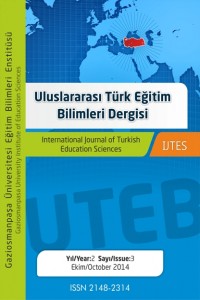Teachers' Views about the Learning Field of “Science, Technology and Society” Teaching in Social Studies
Abstract
This study which aims at revealing teachers’ opinions about the learning field of “Science, Technology and Society” is qualitative. Aim in this study is to present the teachers’ view regarding to “Science, Technology and Society”. Therefore, it is thought that it can be achieved to portray the fact that how this learning area will be more effective and efficient at schools. For this purpose, detailed-interviews have been done with nine teachers. In general, teachers have expressed that teaching of “Science, Technology and Society” lesson in the programme is inefficient and added that this subject is important, it is necessary to give more time in the programme. Participants pointed that learning field of “Science, Technology and Society” make contribution to the students and expressed the importance of this learning field for social studies. They said that they have benefited from updated and concrete sources such as internet, newspapers in the teaching of this teaching field. Difficulties that they have experienced are listed as not having connection between the different periods of time, not knowing the meaning of the notions and the insufficiency of the given examples. To conclude, it can be said that this teaching field is important for students, it is necessary to give more time to this learning field in the programme, it is necessary to enrich the books and make the contents more attractive and it is necessary to benefit from the current issues, concrete events and information technologies more. By this way, it is thought that increasing powers of creative and critical thinking, students can look at the scientific-technological and social developments more totally and understandably; by following the scientific and technological developments more closely, they have been aware of the affects of these developments for the society.
Keywords
References
- Bernal, J. D. (2008). Tarihte bilim (2. cilt). (T. Ok, Çev.). İstanbul: Evrensel Basım Yayın. (Orijinal çalışma basım tarihi 1954.)
- Childe, G. (1992). Kendini yaratan insan. 4. baskı. (F. Ofluoğlu, Çev.). İstanbul: Varlık Yayınları. (Orijinal çalışma basım tarihi 1951.)
- Diamond, J. (2002). Tüfek, mikrop ve çelik. 2. baskı. (Ü. İnce, Çev.). Ankara: TÜBİTAK. (Orijinal çalışma basım tarihi 1997.)
- Dickson, D. (1992). Alternatif teknoloji, teknik değişmenin politik boyutları. (N. Erdoğan, Çev.). İstanbul: Ayrıntı Yayınları. (Orijinal çalışma basım tarihi 1974.)
- Doğan, İ, (2007). Sosyoloji, Ankara: Pegem A Yayıncılık.
- Durant, W. ve Durant, A. (1992). Tarihten dersler. (B. Güvenç, Çev.). İstanbul: Cem Yayınevi. (Orijinal çalışma basım tarihi 1968.)
- Giddens, A. (2005). Sosyoloji, 2. baskı. (Ü. Y. Battal, Çev.), Ankara: Phonix Yayınevi. (Orijinal çalışma basım tarihi 1996.)
- Güvenç, B. (1991). İnsan ve kültür. 5. basım. İstanbul: Remzi Kitabevi.
- Holland, J. H. (2007). Bizi bekleyen gelişmeler ve bunları tahmin etme yolu. J. Brockman (Ed.), Gelecek 50 yıl 5. baskı içinde (191-204). (N. Elhüseyni, Çev.). İstanbul: NTV Yayınları. (Orijinal çalışma basım tarihi 2002.)
- Kongar, E. (1985). Toplumsal değişme kuramları ve Türkiye gerçeği. 4. basım. İstanbul: Remzi Kitabevi.
- Kumar, K. (2004). Sanayi sonrası toplumdan post-modern topluma, (M. Küçük, Çev.), Ankara: Post Kitabevi Yayınevi. (Orijinal çalışma basım tarihi 1995.)
- Levi-Strauss, C. (1994). Yaban düşünce. (T. Yücel, Çev.). İstanbul: Yapı Kredi Yayınları. (Orijinal çalışma basım tarihi 1962.)
- McCellan III, J. E. ve Dorn, H. (2006). Dünya tarihinde bilim ve teknoloji. (H. Yalçın, Çev.). Ankara: Arkadaş Yayınevi. (Orijinal çalışma basım tarihi 1999.)
- Sezal, İ. (2003). Sosyolojiye giriş. İstanbul: Martı Kitap Yayınevi.
- Tezcan, M. (1994). Toplumsal değişme ve eğitim. Ankara: A.Ü.E.B.F. Yayınları.
- Yıldırım, C. (1974). 100 soruda bilim tarihi. İstanbul: Gerçek Yayınevi.
- Yıldırım, A. ve Şimşek, H. (2008). Sosyal bilimlerde nitel araştırma yöntemleri. 7. baskı. Ankara: Seçkin Yayınevi.
Abstract
Keywords
References
- Bernal, J. D. (2008). Tarihte bilim (2. cilt). (T. Ok, Çev.). İstanbul: Evrensel Basım Yayın. (Orijinal çalışma basım tarihi 1954.)
- Childe, G. (1992). Kendini yaratan insan. 4. baskı. (F. Ofluoğlu, Çev.). İstanbul: Varlık Yayınları. (Orijinal çalışma basım tarihi 1951.)
- Diamond, J. (2002). Tüfek, mikrop ve çelik. 2. baskı. (Ü. İnce, Çev.). Ankara: TÜBİTAK. (Orijinal çalışma basım tarihi 1997.)
- Dickson, D. (1992). Alternatif teknoloji, teknik değişmenin politik boyutları. (N. Erdoğan, Çev.). İstanbul: Ayrıntı Yayınları. (Orijinal çalışma basım tarihi 1974.)
- Doğan, İ, (2007). Sosyoloji, Ankara: Pegem A Yayıncılık.
- Durant, W. ve Durant, A. (1992). Tarihten dersler. (B. Güvenç, Çev.). İstanbul: Cem Yayınevi. (Orijinal çalışma basım tarihi 1968.)
- Giddens, A. (2005). Sosyoloji, 2. baskı. (Ü. Y. Battal, Çev.), Ankara: Phonix Yayınevi. (Orijinal çalışma basım tarihi 1996.)
- Güvenç, B. (1991). İnsan ve kültür. 5. basım. İstanbul: Remzi Kitabevi.
- Holland, J. H. (2007). Bizi bekleyen gelişmeler ve bunları tahmin etme yolu. J. Brockman (Ed.), Gelecek 50 yıl 5. baskı içinde (191-204). (N. Elhüseyni, Çev.). İstanbul: NTV Yayınları. (Orijinal çalışma basım tarihi 2002.)
- Kongar, E. (1985). Toplumsal değişme kuramları ve Türkiye gerçeği. 4. basım. İstanbul: Remzi Kitabevi.
- Kumar, K. (2004). Sanayi sonrası toplumdan post-modern topluma, (M. Küçük, Çev.), Ankara: Post Kitabevi Yayınevi. (Orijinal çalışma basım tarihi 1995.)
- Levi-Strauss, C. (1994). Yaban düşünce. (T. Yücel, Çev.). İstanbul: Yapı Kredi Yayınları. (Orijinal çalışma basım tarihi 1962.)
- McCellan III, J. E. ve Dorn, H. (2006). Dünya tarihinde bilim ve teknoloji. (H. Yalçın, Çev.). Ankara: Arkadaş Yayınevi. (Orijinal çalışma basım tarihi 1999.)
- Sezal, İ. (2003). Sosyolojiye giriş. İstanbul: Martı Kitap Yayınevi.
- Tezcan, M. (1994). Toplumsal değişme ve eğitim. Ankara: A.Ü.E.B.F. Yayınları.
- Yıldırım, C. (1974). 100 soruda bilim tarihi. İstanbul: Gerçek Yayınevi.
- Yıldırım, A. ve Şimşek, H. (2008). Sosyal bilimlerde nitel araştırma yöntemleri. 7. baskı. Ankara: Seçkin Yayınevi.
Details
| Journal Section | Articles |
|---|---|
| Authors | |
| Publication Date | October 31, 2014 |
| Submission Date | June 5, 2014 |
| Acceptance Date | October 13, 2014 |
| Published in Issue | Year 2014 Volume: 2014 Issue: 3 |


